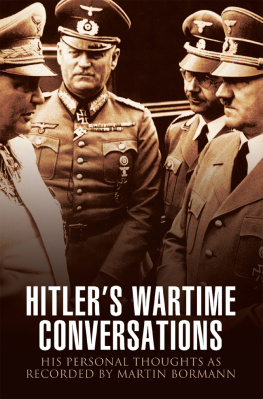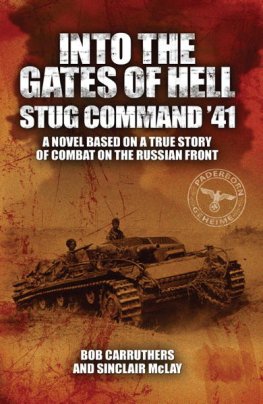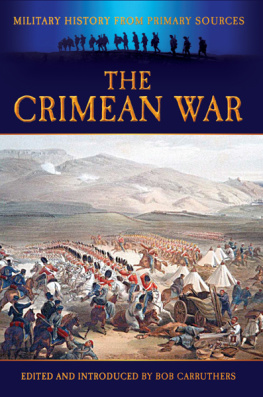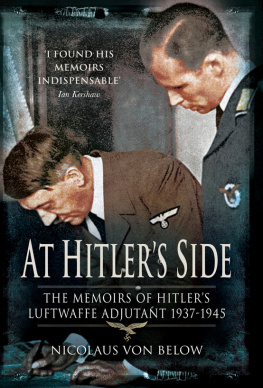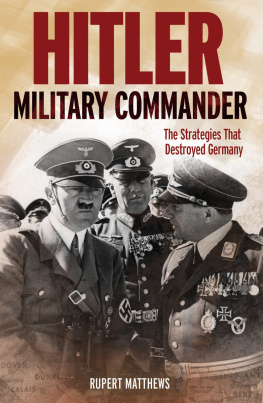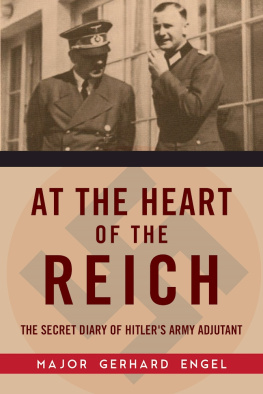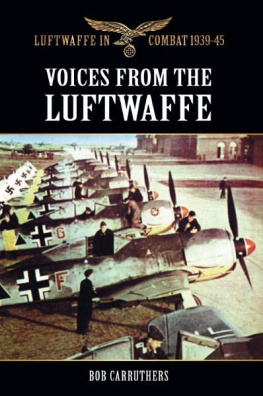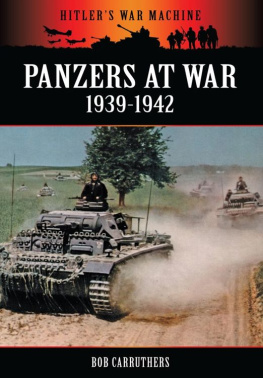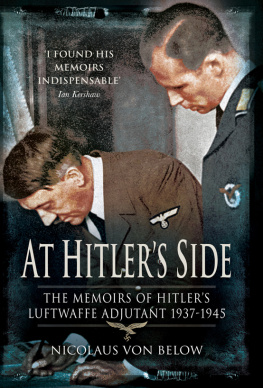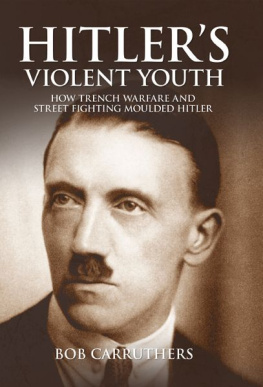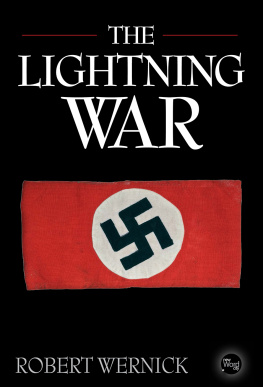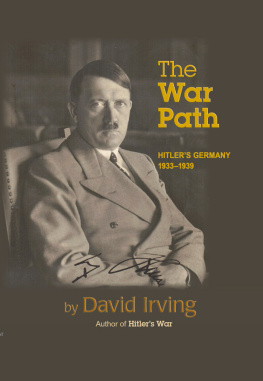HITLERS WARTIME ORDERS
THE COMPLETE
FRTHER DIRECTIVES 1939-1945
Edited and introduced by
BOB CARRUTHERS
This edition published in 2018 by
Pen & Sword Military
An imprint of
Pen & Sword Books Ltd.
47 Church Street
Barnsley
South Yorkshire
S70 2AS
Copyright Coda Publishing Ltd. 2018.
Published under licence by Pen & Sword Books Ltd.
ISBN: 9781473868724
eISBN: 9781473868748
Mobi ISBN: 9781473868731
A CIP catalogue record for this book is available from the British Library.
All rights reserved. No part of this book may be reproduced or transmitted in any form or by any means, electronic or mechanical including photocopying, recording or by any information storage and retrieval system, without permission from the Publisher in writing.
Pen & Sword Books Ltd. incorporates the imprints of Pen & Sword Aviation, Pen & Sword Family History, Pen & Sword Maritime, Pen & Sword Military, Pen & Sword Discovery, Pen & Sword Politics, Pen & Sword Atlas, Pen & Sword Archaeology, Wharncliffe Local History, Wharncliffe True Crime, Wharncliffe Transport, Pen & Sword Select, Pen & Sword Military Classics, Leo Cooper, The Praetorian Press, Claymore Press, Remember When, Seaforth Publishing and Frontline Publishing
For a complete list of Pen & Sword titles please contact
PEN & SWORD BOOKS LIMITED
47 Church Street, Barnsley, South Yorkshire, S70 2AS, England
E-mail:
Website: www.pen-and-sword.co.uk
1939
31 August Directive No. 1
3 September Directive No. 2
9 September Directive No. 3
25 September Directive No. 4
30 September Directive No. 5
9 October Directive No. 6
18 October Directive No. 7
20 November Directive No. 8
29 November Directive No. 9
1940
19 Jan./18 Feb. Directive No. 10
1 March Unnumbered Formal Directive
14 May Directive No. 11
18 May Directive No. 12
24 May Directive No. 13
8 June Directive No. 14
14 June Directive No. 15
16 July Directive No. 16
1 August Directive No. 17
12 November Directive No. 18
10 December Directive No. 19
13 December Directive No. 20
18 December Directive No. 21
1941
11 January Directive No. 22
6 February Directive No. 23
5 March Directive No. 24
27 March Directive No. 25
3 April Directive No. 26
4 April Directive No. 27
25 April Directive No. 28
17 May Directive No. 29
23 May Directive No. 30
9 June Directive No. 31
11 June Directive No. 32
14 July Supplement to Directive No. 32
19 July Directive No. 33
23 July Supplement to Directive No. 33
30 July Directive No. 34
12 August Supplement to Directive No. 34
6 September Directive No. 35
22 September Directive No. 36
10 October Directive No. 37
2 December Directive No. 38
8 December Directive No. 39
1942
23 March Directive No. 40
5 April Directive No. 41
29 May Directive No. 42
11 July Directive No. 43
21 July Directive No. 44
23 July Directive No. 45
18 August Directive No. 46
28 December Directive No. 47
1943
26 July Directive No. 48
31 July Directive No. 49
28 September Directive No. 50
3 November Directive No. 51
1944
28 January Fhrer Order
8 March Fhrer Order No. 11
2 April Operation Order No. 7
16 May Fhrer Order
12 July Fhrer Order
13 July Fhrer Decree
19 July Fhrer Order
23 July Fhrer Order
26 July Fhrer Order
24 August Fhrer Order
29 August Fhrer Order
1 September Fhrer Order
3 September Fhrer Directive
7 September Fhrer Order
9 September Fhrer Order
12 September Fhrer Order
22 September Fhrer Decree
28 November Fhrer Order
1945
21 January Fhrer Order
28 January Fhrer Order
5 February Fhrer Order
20 March Fhrer Order
7 April Fhrer Order
15 April Fhrer Order
15 April Fhrer Order
Introduction
H ITLERS orders and directives form a powerful primary source record of the conduct of the Second World War at the strategic level. They provide a compelling insight, from the German perspective, into how Hitlers war was planned and fought by the all-powerful Supreme Commander.
However, it is vital to understand that the man issuing the strategic decrees and orders in the Second World War was a complete novice who had never risen above the rank of private. It is sobering to consider the fact that, during the Second World War, Hitler was learning the role of Supreme Commander. In order to overcome his lack of practical experience he relied upon his political skills and his gamblers instinct to exercise an iron grip on the German military machine. In order to comprehend Hitler as Supreme Commander we must first take account of his service as a soldier in the Great War.
In July 1914, the news of the assassination of Archduke Ferdinand reached Munich. There followed a few days of high tension, then, on Saturday 1 August 1914, in response to the news of Russian mobilisation, came the order for the mobilisation of the German war machine. The Great War had begun. For Adolf Hitler, what he described as the most memorable period of his life had now commenced. Faced with the prospect of that titanic conflict, it seemed to him that all of his past fell away. With a wistful pride, Hitler, in the pages of Mein Kampf , looked back on the days of war with a warm enthusiasm and a delight that fortune had permitted him the honour of taking his place in that heroic struggle.
In 1914, the state of Bavaria still maintained its own standing army, however, in the event of war, the Bavarian army formed a component part of the Imperial German Army. As such the Bavarian army took its marching orders from Prussia and, although it still maintained its own recruiting and logistical systems based in Munich, it came firmly under the direct control of Berlin. It is no surprise therefore that Hitler was part of the cheering crowd on Munichs Odeonsplatz, where he was famously photographed by Heinrich Hoffmann on Sunday 2 August 1914. In the infamous photograph Hitler can be clearly seen waving his hat enthusiastically and welcoming the news that war had been declared on Russia the day before. Shortly following the dispersal of the Munich crowd Hitler volunteered for service in the Bavarian army. He dashed off an application for permission to enlist in a Bavarian regiment and was directed to report himself immediately at the nearest barracks. Despite having been declared unfit for Austro-Hungarian service only the year before, Hitler, despite not being a German national, had somehow succeeded in obtaining permission to join the List Regiment.


